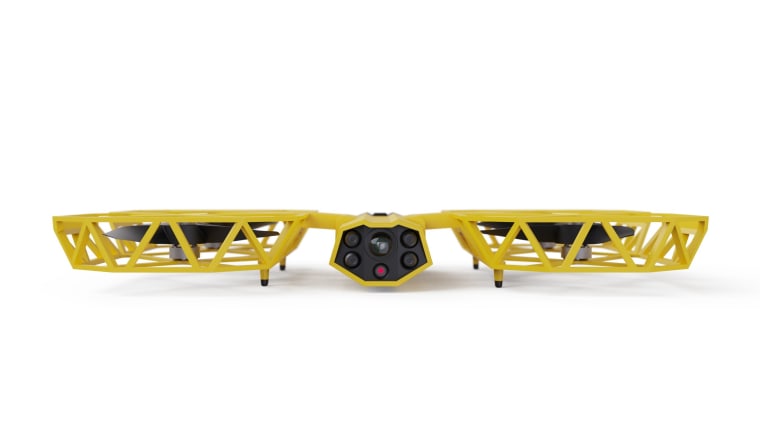The company behind the Taser brand of stun guns said Thursday that it plans to put its weapons on drones and sell the devices as a way to stop shootings in American schools, an idea that drew an immediate public rebuke from the company's ethics board.
Axon CEO Rick Smith said that he has been exploring such a system for years and even published a graphic novel about it, and that he had now run out patience with the "fruitless" national gun debate.
Axon plans to develop "a remotely operated, non-lethal drone system that we believe will be a more effective, immediate, humane, and ethical option to protect innocent people," Smith said in a statement.
But an ethics advisory board that Axon set up in 2018 to guide the company's work on artificial intelligence warned that Axon was rushing the adoption.
"We think Axon's decision is deeply regrettable," the board said in an unsigned statement posted to Twitter.
The ethics board said that the idea of a Taser-equipped drone was brought to the board more than a year ago, and that after lengthy deliberations, a majority of the board last month voted against Axon moving forward even with a limited pilot project.
The board said Axon was pursuing a "notable expansion" of what was previously under consideration, potentially making the technology available to more clients than just policing agencies and placing surveillance cameras in schools to stream real-time to police.
"Reasonable minds can differ on the merits of police-controlled Taser-equipped drones — our own Board disagreed internally — but we unanimously are concerned with the process Axon has employed regarding this idea of drones in school classrooms," the ethics board said.
The board is advisory, and Axon management isn't required to follow its guidance. Its members include privacy advocates, former police chiefs, civil rights advocates and computer scientists.
Danielle Citron, a member of the ethics board and a University of Virginia law professor, said it was possible that some or all board members would resign because of Smith's decision.
"There's a lot of disappointment, but a lot of us don't want to be hasty and lose the chance to have an influence," she said. "If we all resign, then who's there?"
Citron said that Smith has otherwise been attentive to the ethics board, attending its meetings personally and often accepting its advice. She said she believes Smith is moving ahead with the drone idea out of a genuine desire to eliminate firearms deaths.
"It's the real deal, his concern about an alternative to guns and bullets," she said. "He's a very thoughtful guy."
Axon, formerly known as Taser, is based in Scottsdale, Ariz., and has long been at the center of public debates around police and security equipment. Hundreds of people have died after police used Tasers on them, according to news media tallies, and Axon's police body cameras have raised privacy concerns.
Three years ago, in response to a report from the ethics advisory board, Axon said it would not add a facial recognition feature to its cameras.
Smith, the CEO, said he didn't want to wait on the drone product any longer.
"Now is the time to make this technology a reality — and to begin a robust public discussion around how to ethically introduce non-lethal drones into schools," he said in his statement.
Smith drew a comparison between his vision for a nationwide Taser-equipped drone network and indoor fire sprinklers.
"There are over 10 million fire hydrants pre-emplaced in the United States, and every modern building has fire suppression systems to contain fires until fire-fighters can arrive," he said.
"I believe we can create systems that can detect, deter, and ultimately stop a shooter within a building for a comparable cost as, or less than, fire suppression systems."
Smith planned to answer questions about the idea Friday at 1 p.m. Eastern on the Reddit forum "Ask Me Anything," Axon said.
Axon said it would use virtual reality headsets for training, and that all decisions on whether to use a Taser would be made by an "authenticated and authorized human operator who has agreed to take legal and moral responsibility for any force actions initiated."
The idea of armed, remote-controlled, flying robots appeared long ago in science fiction, and U.S. authorities have long sought to prevent their use among civilians. The Federal Aviation Administration issued a reminder in 2019 that operating a drone with a dangerous weapon attached was illegal without FAA authorization.
"Perhaps you've seen online photos and videos of drones with attached guns, bombs, fireworks, flamethrowers, and other dangerous items," the agency said then.
"Do not consider attaching any items such as these to a drone because operating a drone with such an item may result in significant harm to a person and to your bank account."
A spokesperson for the FAA said the agency had no immediate comment on Axon's proposal.
Investors reacted positively. Axon's share price rose 5.8 percent Thursday, compared to a 1.8 percent rise in the S&P 500.
